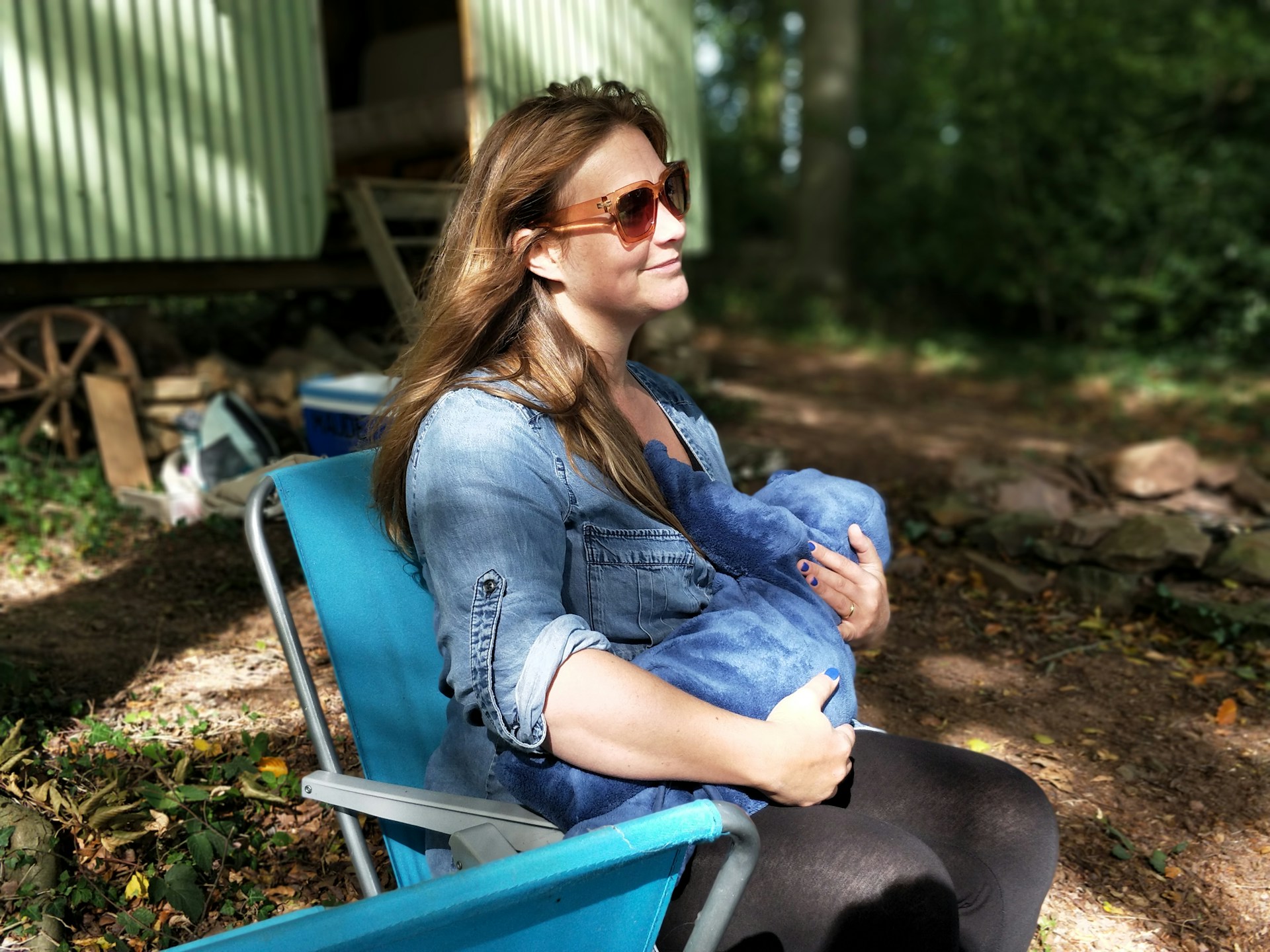Enhancing Knowledge and Attitudes: Emo Demo's Effectiveness in Breastfeeding Practices (A Pilot Study in Gili Iyang Island)
Meningkatkan Pengetahuan dan Sikap: Efektivitas Emo Demo dalam Praktik Menyusui

Downloads
Background: Exclusive breastfeeding for the first six months of an infant's life and appropriate complementary feeding are essential for child growth and development. However, the low knowledge and attitudes of mothers and caregivers on Gili Iyang Island pose a challenge in achieving optimal infant feeding practices.
Objectives: To determine the effectiveness of emo-demo in improving knowledge and attitudes regarding exclusive breastfeeding and appropriate complementary feeding in Gili Iyang Island.
Methods: This pilot study used a pre-test-post-test design with two post-intervention measurements. Respondents consisted of 20 pregnant women and 16 caregivers. The sample was taken by total sampling. Data were analyzed using the Wilcoxon test.
Results: The analysis showed a significant increase in the knowledge score of pregnant women after (p=0.008) and 30 days after the emo-demo activity (p=0.008). However, there was no significant change in maternal attitude (p=0.417). In the caregiver, there was a significant increase in knowledge after (p=0.003) and 30 days after the activity (p=0.003) and in the attitude of the caregivers 30 days after the activity (p=0.013).
Conclusion: Emo-demo is effective in improving the knowledge of pregnant women and their caregivers regarding exclusive breastfeeding and appropriate complementary feeding. However, the effect on participants' attitudes requires additional approaches for more optimal results.
Alves, R.F. (2024) ‘The relationship between health-related knowledge and attitudes and health risk behaviours among Portuguese university students’, Global Health Promotion, 31(1), pp. 36–44. https://doi.org/10.1177/17579759231195561.
Bektas, I. and Arkan, G. (2021) ‘The Effect of Perceived Social Support of Syrian Mothers on Their Infant Feeding Attitudes’, Journal of Pediatric Nursing, 57, pp. e40–e45. https://doi.org/10.1016/j.pedn.2020.10.005.
BKKBN (2021) ‘Peraturan BKKBN No. 12 Tahun 2021 Tentang Rencana Aksi Nasional Percepatan Penurunan Angka Stunting Indonesia Tahun 2021-2024’. Available at: www.peraturan.go.id.
BPS (2024) Persentase Bayi Usia Kurang Dari 6 Bulan Yang Mendapatkan Asi Eksklusif Menurut Provinsi (Persen), 2021-2023, BPS. Available at: https://www.bps.go.id/id/statistics-table/2/MTM0MCMy/persentase-bayi-usia-kurang-dari-6-bulan-yang-mendapatkan-asi-eksklusif-menurut-provinsi-persen-.html (Accessed: 19 January 2025).
Dahake, S. and Shinde, R. (2020) ‘Exploring husband’s attitude towards involvement in his wife’s antenatal care in urban slum community of Mumbai’, Indian Journal of Community Medicine, 45(3), p. 320. https://doi.org/10.4103/ijcm.IJCM_344_19.
Dinkes Sumenep (2022) Profil Kesehatan Dinkes Kabupaten Sumenep. Sumenep.
Ghozali, I. (2018) Aplikasi Analisis Multivariate dengan Program IBM SPSS 25. Semarang: Badan Penerbit Universitas Diponegoro.
Ida, M., Hayati, S. and Sari, P.I. (2021) ‘Hubungan Pemberian Mp-ASI Dini Dengan Kejadian Diare Pada Bayi 0-6 Bulan Puskesmas Ciumbuleui’, Jurnal Keperawatan BSI, 9(1). Available at: https://www.bps.go.id/id/statistics-table/2/MjExMyMy/rata-rata-pengeluaran-perkapita-seminggu--menurut-kelompok-daging-per-kabupaten-kota--rupiah-kapita-minggu-.html (Accessed: 18 April 2025).
Lestiarini, S. and Sulistyorini, Y. (2020) ‘Perilaku Ibu pada Pemberian Makanan Pendamping ASI (MPASI) di Kelurahan Pegirian’, Jurnal PROMKES, 8(1), p. 1. https://doi.org/10.20473/jpk.v8.i1.2020.1-11.
Lutter, C.K., Grummer-Strawn, L. and Rogers, L. (2021) ‘Complementary feeding of infants and young children 6 to 23 months of age’, Nutrition Reviews, 79(8), pp. 825–846. https://doi.org/10.1093/nutrit/nuaa143.
Musfiroh, S., T, R.Y., Nabilah, A., B, F.M., L, I.E., Fransiska, O., Amalia, R. and Aisyah, Z.N. (2023) ‘Literature Review: Hubungan Hormon dan Psikologi pada Ibu Masa Perinatal’, Jurnal Maternitas Kebidanan, 8(2).
Nurmawati and Nurfadhilah (2020) ‘An Act to Support only Breast Milk for Infants’, The Southeast Asian Journal of Midwifery, 6(1), pp. 22–27.
Ogbo, F., Akombi, B., Ahmed, K., Rwabilimbo, A., Ogbo, A., Uwaibi, N., Ezeh, O. and Agho, K. (2020) ‘Breastfeeding in the Community—How Can Partners/Fathers Help? A Systematic Review’, International Journal of Environmental Research and Public Health, 17(2), p. 413. https://doi.org/10.3390/ijerph17020413.
Rojas‐García, A., Lingeman, S. and Kassianos, A.P. (2023) ‘Attitudes of mothers and health care providers towards behavioural interventions promoting breastfeeding uptake: A systematic review of qualitative and mixed‐method studies’, British Journal of Health Psychology, 28(4), pp. 952–971. https://doi.org/10.1111/bjhp.12663.
Sabriana, R., Riyandani, R., Wahyuni, R. and Akib, A. (2022) ‘Hubungan Pengetahuan dan Sikap Ibu Tentang Pemberian ASI Eksklusif’, Jurnal Ilmiah Kesehatan Sandi Husada, pp. 201–207. https://doi.org/10.35816/jiskh.v11i1.738.
Shittu, F., King, C., Rautiainen, S., Iuliano, A., Bakare, A.A., Colbourn, T., Bakare, D., Salako, J., Graham, H.R., Falade, A.G. and Burgess, R.A. (2024) ‘Exploring the feeding practices of mothers of under-five children and how household members influence exclusive breastfeeding in Jigawa State, Nigeria – A qualitative study’, Global Public Health, 19(1). https://doi.org/10.1080/17441692.2024.2426135.
Supriyadi, S., Katmawanti, S., Firdausi, R. and Aflah Samah, D. (2021) ‘The Effectiveness of Emo-Demo in Increasing the Knowledge and Attitudes in Mother Who Do Not Provide Exclusive Breastfeeding in the Working Area of Cisadae Public Health Center in Malang’, KnE Life Sciences [Preprint]. https://doi.org/10.18502/kls.v0i0.8871.
Teng, E., Anthony, V., Helen, W. and Shona, C. (2020) ‘Is Knowledge Enough? The Relationship Between Mental Health Knowledge and Stigmatising Attitudes Among Australian Adolescents’, Adolescent Psychiatry, 9(3), pp. 206–219. https://doi.org/10.2174/2210676609666181204145835.
UNICEF (2022) Infant Feeding Area Graphs Interpretation Guide for infant and young child feeding at 0–5 months. New York: UNICEF.
Wahyuni, S., Arief, Y.S., Triharini, M. and Nursalam, N. (2024) ‘Husband’s Contributions to Stimulate Wife’s Confidence Experiencing Role Transition: Cross-Sectional Study’, SAGE Open Nursing, 10. https://doi.org/10.1177/23779608241304716.
Copyright (c) 2025 Rino Tryanto Keya, Aristanto Prambudi, Fatimah Dwi Cahyani, Galuh Mega Kurnia, Anggun Wahyu Widoretno, Ahsanu Bil Husna, Moh. Bahmid, Edi Hermanto, Tausyiah Rohmah Noviyanti, Yuliana Purnama Sari Min, Rika Satya Dewi, Shimarti Rukmini Devy, Mochammad Bagus Qomaruddin, Rachmah Indawati

This work is licensed under a Creative Commons Attribution-ShareAlike 4.0 International License.
Media Gizi Kesmas by Unair is licensed under a Creative Commons Attribution-ShareAlike 4.0 International License.
1. The journal allows the author(s) to hold the copyright and to retain the publishing right of the article without restrictions.
2. The legal formal aspect of journal publication accessibility refers to Creative Commons Attribution-Share-Alike (CC BY-SA).
3. The Creative Commons Attribution-Share-Alike (CC BY-SA) license allows re-distribution and re-use of a licensed work on the conditions that the creator is appropriately credited and that any derivative work is made available under "the same, similar or a compatible license”. Other than the conditions mentioned above, the editorial board is not responsible for copyright violations.



















